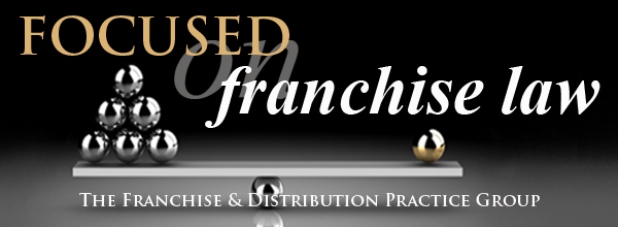Franchisor 101: DBO re Outdated FDDs & Unregistered Franchises; and Domino’s Delivered NY Wage Theft Claims

bkurtz@lewitthackman.com
tgrinblat@lewitthackman.com
msoroky@lewitthackman.com
kwallman@lewitthackman.com
July 2016
David Gurnick in The Franchise Lawyer
”Franchise systems can build anti-terrorism measures into their systems, in ways that make business sense and align with their legal and moral principles…”
Click to read: Franchise Systems’ Roles in Combatting Terrorism
FRANCHISOR 101:
Outdated FDDs and Unregistered Franchises
The California Department of Business Oversight (“DBO”) recently issued three Orders against franchisors for violating California’s franchise laws.
No Good Deed
#1: Senior’s Choice provides companion care services to seniors. In 2013 Senior’s Choice renewed their franchise registration and disclosed the initial franchise fee was $45,000. Then they provided a prospective franchisee an older Franchise Disclosure Document, stating an initial fee of $25,000 not $45,000.
The DBO found Senior’s Choice violated the law by:
- not providing the current FDD;
- selling a franchise on terms that differ from the registered offer (by lowering the initial fee from $45,000 to $25,000); and
- violating a prior Desist and Refrain order from 2007 for unlawfully selling franchises without registration.
The DBO ordered Senior Choice directors, officers and managers to attend training on franchise law compliance, pay a penalty of $7,500 and not further violate the Franchise Investment Law.
This case shows that the government objects even when franchisors act to benefit franchisees (by lowering fees) or accidentally provide the wrong FDD.

Brewer’s Remorse
 #2: In the Great Khan case, the DBO found Great Khan and its principals sold unregistered franchises and issued an order prohibiting further violations. Great Khan obtained a franchise registration in 2001 but failed to renew the registration in 2002.
#2: In the Great Khan case, the DBO found Great Khan and its principals sold unregistered franchises and issued an order prohibiting further violations. Great Khan obtained a franchise registration in 2001 but failed to renew the registration in 2002.
After expiration of the registration, Great Kahn sold five franchises to California residents. Each franchisee paid an initial fee of at least $25,000. Great Khan and its principals were ordered to Desist and Refrain from further offers or sales until their franchises were registered or exempt from the registration requirements.
#3: In a third case the DBO found World Coffee Kiosk (WCK) offered and sold franchises without registration. WCK sold a business in which the operator sold approved coffee drinks, food products and merchandise in an assigned territory from kiosks at malls. Additionally, the operator was required to use approved signage and advertising and operate under WCK‘s plan, manual, policies, standards and procedures. WCK could require an operator to relocate.
Operators paid an initial franchise fee of at least $25,000. The DBO found this was a franchise that was not registered or exempt. WCK was ordered to Desist and Refrain from further offers or sale of franchises until they registered or satisfied an exemption.
The Great Khan and World Coffee Kiosk cases show that failing to renew a registration or not registering at all can have serious consequences and penalties.
Domino’s Delivered NY Wage Theft Claims

In May, 2016, the New York Attorney General (AG) brought a claim against Domino’s Pizza for labor code violations at three franchised locations.
The AG alleged failure to pay delivery workers the legal minimum wage and overtime, and failure to fully reimburse workers for delivery expenses – totaling over $567,000 in back wages and underpayments to workers, liquidated damages and interest.
The NY AG alleged Domino’s is liable as a joint employer because it exercised a high level of control over employee conditions at franchised stores and had a significant role in causing wage violations; and that Domino’s role was significant in hiring, firing, discipline, wage payments, and in oversight and supervision of work.
The franchisor allegedly caused many of the wage violations by encouraging franchisees to use a “Payroll Report” function in the software system Domino’s specified for franchisees (called “PULSE”). The AG claimed Domino’s knew, but failed to disclose, that PULSE’s “Payroll Report” systematically under-calculated gross wages owed to workers.
The Domino’s case shows that franchisors should be careful in exercising control over a franchisee’s operations concerning hiring, firing and employee relations, and should carefully evaluate whether to assist with payroll software. These controls can lead to claims by the government and franchisees that the franchisor exercises control and is therefore liable for claims at franchised locations.

